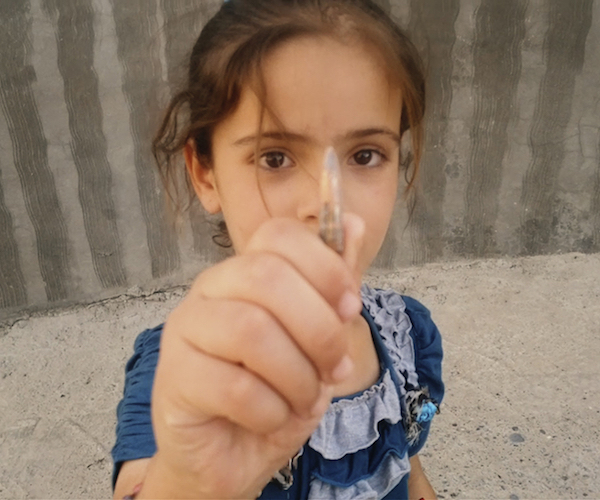Film Review: “Nowhere to Hide” — A Potent Documentary about the Never-ending War in Iraq
How palpable is the combat in Nowhere to Hide!

A scene from “Nowhere to Hide.”
By Gerald Peary
I surmise that Nori Sharif, who is the Iraqi hero-protagonist of the potent documentary, Nowhere to Hide, at the Museum of Fine Arts Boston through December 16, is a Sunni, but he never says so. This warm, kind young man is apolitical in the best, humane sense, someone who mourns everyone and everything that has been destroyed in the never-ending war in Iraq. “Only God knows what is behind this big game,” he declares several times, evoking Allah, but also he speaks like a scion of Bertolt Brecht: “Wars are planned by the elite, the dumb die in it, the opportunists benefit from it. “
In 2012, when this film begins, Sharif is in a celebratory mood. The Americans have left Iraq and, even with a Shia government, peace seems possible. He’s a happy family man with a wife and four kids and a modest home; and he revels in his work as a male nurse in the local hospital in his town of Jawalwa. What he’s hoping to do is what he did before there was fighting: patch broken arms and legs.
But quickly, all falls apart, and he’s faced with the impossible, trying to save those hit by random bullets, suicide bombs, by various militias on all sides. Shia vs. Sunni, Isis vs. Kurds, Al Queda never going away. His hospital drowns in blood.
Sharif’s weapon in response: a camera supplied to him by the film’s director, Zaradasht Ahmed, who—two cameras in all– films Sharif making a video record of the dying of Iraq. What this Iraqi shoots, as a moral witness, is harrowing and excruciating, sometimes impossible to watch. Various people lying on their backs in tents, wasting their lives away as they’ve been paralyzed by bullets or bombs. Children mourning their relatives in zipped-up body bags. Children themselves, wounded and stunned. Cars torn apart by bombs, cars caught in crossfire in which the occupants have been murdered.
(Dear George W. Dear Dick Cheney. Dear Donald Rumsfeld: You should be watching this film, you smug bastards, to see what you did to Iraq.)
And, yes, things get even worse. Isis attacks Jawalwa, and all those working in the hospital need to flee. Nori Sharif, who has been filming victims, becomes a victim himself, driving with his family into the boiling desert to escape. He says of the slaughter: “Like an evil witch, it follows our path.”
How palpable is the combat in Nowhere to Hide! As Sharif turns his camera in his car on his sweet, adorable, innocent children, I felt my non-religious self almost praying that nobody harms them, that no plane drops a bomb on them. Sharif tries to sound optimistic: “In the end the will to build will triumph over the will to destroy,” but the reality is that his family now, in 2017, are squeezed into a displaced person camp, where anything can happen to them.
(Dear Donald Trump: Their home town no longer exists, leveled by Isis. I know there’s no chance, you uncaring bastard, that you’d ever allow Nori Sharif’s family to resettle in the USA. Illegal immigrants.)
As Iraq collapses, Sharif amends his thoughts on the war: “Thousands are killed, not just the dumb. And even the opportunists don’t benefit from it in the end.” But he remains as compassionate at ever, mourning the deaths of members of the Iraqi army, his seeming Shia enemies, saying, “How bad for their families.”
Gerald Peary is a retired film studies professor at Suffolk University, Boston, curator of the Boston University Cinematheque, and the general editor of the “Conversations with Filmmakers” series from the University Press of Mississippi. A critic for the late Boston Phoenix, he is the author of nine books on cinema, writer-director of the documentaries For the Love of Movies: the Story of American Film Criticism and Archie’s Betty, and a featured actor in the 2013 independent narrative Computer Chess.
